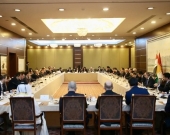Netanyahu says 'bad deal' with Iran could lead to war

(Reuters) - Israeli Prime Minister Benjamin Netanyahu warned on Wednesday that a "bad deal" between global powers and Iran over its nuclear program could lead to war.
His government said an offer on the table for what Washington calls a "modest" easing of sanctions would in fact negate up to 40 percent of the sanctions' impact, reducing pressure on Tehran to give up a nuclear program that the West and Israel believe is aimed at building a bomb.
The Jewish state has been lobbying hard against a proposed deal, which would initially offer partial relief from sanctions in return for some steps by Iran to constrain its activities.
Negotiations between Iran and six U.N. powers - the United States, Britain, France, Germany, Russia and China - broke up without agreement in Geneva on Saturday but are scheduled to resume on November 20 with both sides saying they are optimistic.
Western diplomats involved in the process declined comment on the Israeli assessment of how a deal might affect sanctions, saying the terms of any accord were uncertain and still secret.
Iran says its nuclear program is peaceful. The United States and the European Union believe it is seeking a nuclear bomb and imposed tough oil and financial sanctions last year that have caused serious economic harm.
Addressing Israel's parliament in Jerusalem, Netanyahu said continued economic pressure on Iran was the best alternative to two other options, which he described as a bad deal and war.
"I would go so far as to say that a bad deal could lead to the second, undesired option," he said, meaning war.
Israel, believed to be the sole nuclear power in the Middle East, has long said it reserves the right to use force to prevent Iran from gaining a nuclear weapon. However, many military experts doubt Israel has the capability to destroy Iran's nuclear sites without U.S. help.
Washington says it is important to seek a negotiated solution, especially since Iran elected a relative moderate this year as president, Hassan Rouhani.
The United States has maintained that any initial change in sanctions on offer would be modest and reversible, but Israel says the benefits to Iran would be greater than implied and the steps Tehran would take would do little to curb its ambitions.
Netanyahu's point man on Iran policy, Strategic Affairs Minister Yuval Steinitz, said the relief package offered to Iran as part of negotiations could be worth up to $40 billion.
NEGOTIATIONS SECRET
He said Israel believed the sanctions put in place by the United States and European Union last year cost Iran's economy around $100 billion per year, or nearly a quarter of its output.
"The sanctions relief directly will reduce between $15 to $20 billion out of this amount," Steinitz said on Wednesday at an English-language event hosted by the Jerusalem Press Club.
He added that the proposed changes would also make it more difficult to enforce sanctions overall, providing a total benefit to Tehran of up to $40 billion:
"The damage to the overall sanctions, we believe, will be something between $20 billion and maybe up to $40 billion," he said. "This is very significant. It's not all the sanctions. It's not the core sanctions about oil exports and the banking system, but it's very significant relief for the Iranians."
Several Western officials contacted by Reuters declined to confirm or deny specific figures for the value of the sanctions relief on offer from the six powers and cautioned against revealing the terms of a possible deal at such an early stage.
"There is an offer on the table, and it seems to me that is considerable progress. We can't give any technical details and the day anything leaks out is the day someone wants the negotiations to fail," said a Western diplomat.
A European diplomat said details were being withheld on purpose: "A decision was made to keep everything quiet, tightly held," the diplomat said, "Because there are extreme positions on both sides that could use this to discredit the process and try to derail the negotiations."
(Additional reporting by John Irish and Richard Mably; Writing by Peter Graff; Editing by Alastair Macdonald)












